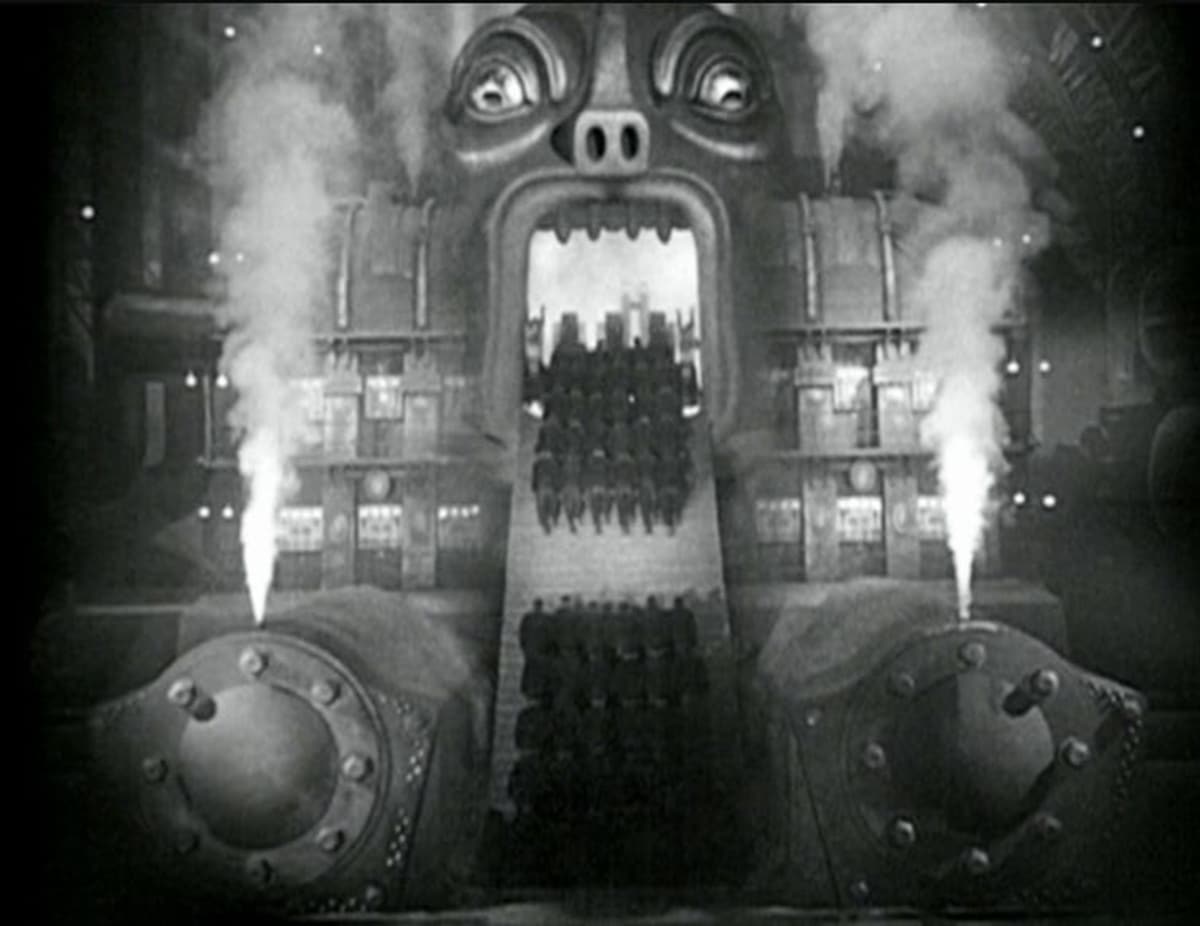

Total Work (Chrono-Politics, Part 1)
by W.D. James | July 10, 2024
You load 16 tons, what do you get?
Another day older and deeper in debt
St. Peter, don’t you call me ’cause I can’t go
I owe my soul to the company store
– Tennessee Earnie Ford, Sixteen Tonsi
Time is a fundamental aspect of our existence. Probably the most important thinker of the 20th century, Martin Heidegger, wrote a huge book called Being and Time, as if there wasn’t much else to consider, and perhaps there isn’t. Further, while nothing may seem more objective than time, our relationship to it is complex. It might seem like fate itself: ‘time is running out’, ‘you can’t turn back the hands of time’. Yet it has a qualitative dimension as well. When bored or overtaxed, time may seem to ‘drag’. When having fun or while working in what some modern psychologists call ‘flow’, time may seem to ‘fly.’
Yet time is also a metaphysical reality. To a student who asked him what God was doing before He created time, Augustine of Hippo famously quipped something like, ‘preparing hell for people who ask such questions.’ As the modern era was ushered in, our relationship to time was one of the fundamental changes that took place. As is well known, the institutionalization of ‘clock time’, as opposed to a more customary and nature-based relationship to time with the organic rhythm of night and day and the seasonal progression, was essential to industrialization, the creation of wage-labor, and to secularization more broadly. Time became subordinate to economics and human projects.

Our relationship to time also became dehumanizing. At least such is the position of the German philosopher Josef Pieper (1904-1997), who will be our guide in the first couple of essays in this series. In his 1948 book Leisure: The Basis of Culture, he set about to defend ‘leisure’ against the totalizing claims of ‘work.’ What he helps us to see is that to conceive of time from the perspective only of our material and productive lives is to diminish time, and ourselves in the process. It represents the eclipse of our intellectual and spiritual existence. We exist in a dialectical relationship with time. We can interact with time as if though we were fully subsumed by the temporal, or we can interact as if though we are spiritual beings who can in some sense transcend it. Pieper helps us see that both aspects are natural to us and, hence, our relationship to time needs to reflect both aspects of our reality. Our modern condition had tended to emphasize the former relationship to time, and, hence, this is a part of how the overall story of modern civilization has degraded our existence.
Total Work
Pieper opens his short book with this quote from Plato:
“But the gods, taking pity on human beings—a race born to labor—gave them regularly recurring divine festivals, as a means of refreshment from their fatigue; they gave them the Muses, and Apollo and Dionysus as the leaders of the Muses, to the end that, after refreshing themselves in the company of the gods, they might return to an upright posture.”ii
For now, let’s just note that what is suggested here is that our laboring life is not the whole story. It is not even the most important part of the story. Yes, we labor. In the book of Genesis, labor is even part of our pre-fall existence in Eden (though it gets harder after the fall – men sweat more and the ground is less fertile, and for women childbirth is accompanied by pain). But human religions have always made provision for more than this. The gods are gracious I suppose. More to the point, our nature demands more. Labor can’t be the whole story. We are more than toilers. We have recourse to the company of the gods. We have the intellects connected to Apollo and the ecstatic intuitions associated with Dionysus and from these we can craft the nearly divine poetry of our lives. There, in the company of the gods, we are more ourselves. After that, we can resume the full dignity of “an upright posture.” Such, anyway, has been the primordial intuition of our species.

Pieper saw that a fundamental change had occurred in our relationship to work in the modern era compared to the classical and medieval worlds and a “total world of work” had come to predominate. The fundamental question was: do we have leisure so that we might work or work so that we might have leisure?
He says all traditional peoples would have adopted the latter position: it is while at leisure that we are most human, and we only work so that we might have times of leisure. For moderns though, he says it is the former position that holds: we only have leisure (which, as we shall see, is actually just rest, not leisure) so that we might return to work refreshed. In the modern world, we live to work.
In our altered conception of our relationship to time and our understanding of what it is for, a lot is at stake. Pieper warns: “An altered conception of the human being as such, and a new interpretation of the meaning of human existence as such, looms behind the new claims being made for ‘work’ and the ‘worker’.”iii He discerns that our culture has come to devalue all use of time that is not seen as work (or as a break, or rest, from work, which is then still at the service of work). We don’t even really know how to not-work: we get bored, need something to do to ‘spend our time on’, and are ill at ease when not stimulated.
The specific time during which he was writing was when Germany was emerging from the devastation of two world wars. There was work to be done, and Pieper does not dispute that. However, he thinks that all may be lost if we focus exclusively on work and production.
It is human destiny, as long as we are exiled from the Land of Cockaigne anyway, to work. But how much of ourselves do we owe to work: all or only a part? In the modern world, Pieper asks, “Is there still an area of human action, or human existence as such, that does not have its justification by being part of the machinery of a ‘five year plan’?”iv We should not think that with the reference to the five year plan, Pieper thinks his accusation only applies to Communist or Nazi regimes. He certainly thinks the phenomenon of the ‘total world of work’ applies at least as much to liberal democratic societies as well. Let us remember that the average American still works a longer typical workday than the average worker in the ‘materialist’ Soviet Union did and with similar numbers of days off, not fewer.v

Pieper admits that the life of work, the life of a functionary within the overall social activity of production, is the norm. But he asks, “Can the human being be satisfied with being a functionary, a worker?”vi To be concise: work is necessary to human life, but is it also sufficient?
He is clear that by ‘worker’ he does not mean just the poor or just the manual worker, but pretty much all of us as conceived by the modern society geared toward production: what he terms “the total working state.” He summarizes his outline of the human-as-worker: “Our brief sketch of the ‘Worker’ type has brought into the open three principal characteristics: an outwardly directed, active power; an aimless readiness to suffer pain [to continue laboring]; an untiring insertion into the rationalized program of useful social organization.”vii The Worker is the one whose time is exclusively given over to the useful. Activities which are of value in and of themselves are, strictly speaking, useless: they don’t lead to some other good. Even in our ‘off time’ we set goals for ourselves, we measure our progress (how many times did I make it to yoga class this week, how many miles am I up to on my morning run, how many self-help books did I read this month?). In the realm of production, all meaningful activity must lead to a useful, desired result. As we will see, the useless is not the valueless. The contemplation of natural beauty is not for something else, it is sufficient unto itself. But it is, in this sense, useless. The exclusive focus on the useful cuts us off from much in the natural world, the whole of any supernatural world, and much within ourselves. This is his animating concern.
(De)Proletarianization
In essence, modernity proletarianizes humanity: we are all understood, and increasingly understand ourselves, in terms of our role as worker, producer, achiever. If someone asks us ‘what do you do?’, we tell them our job title. If we don’t have a job of that sort, because we are a fulltime parent or something, then we essentially apologize: ‘I’m just a stay at home mom.’ Yet, clearly, we do many other things. We dance. We worship. We read. We daydream. We play with our kids. We swim. But it is just understood that none of those things can justify our existence. What he is getting at here is not just that work is imposed (though it is), but that we tend to internalize the values of work and form our identities around them. I think this is born out best by the number of really wealthy people who still choose to work very hard. Pieper does not hesitate to call this a “demonic power” which manifests itself in “the totalitarian claims of the world of work.”viii He clarifies: “To be bound to the working process is to be bound to the whole process of usefulness, and moreover, to be bound in such a way that the whole life of the working human being is consumed.”ix To be bound to the whole process of usefulness is to be a means, a tool. We aren’t just that. In In Tune With the World: A Theory of Festivity (1963), he warns: “With the death of the concept of human activity that is meaningful in itself [vs the functional meaning associating with work, which we do for some purpose beyond itself] the possibility of any resistance to a totalitarian laboring society also perishes (and such a regime could very well be established even without concomitant political dictatorship).”x

One consequence of viewing the human under the type of the Worker is that education ceases to be cultivation and development (bildung) and becomes merely training. “Training is distinguished by its orientation toward something partial, and specialized, in the human being, and toward some one section of the world. Education is concerned with the whole….”xi This intentional underdevelopment is a goal, not a bug, of the system: “the total-working state needs the spiritually impoverished functionary….”xii For Pieper, the well-paid engineer, physician, or attorney are just as ‘proletarianized’ in the modern world as are the line worker, the service worker, or the construction worker. The fundamental problem is that the human and her relationship to time has been misunderstood.
Pieper is clear that the solution is not the socialist solution of making everyone proletarian. The solution is de-proletarianization of everyone. Leisure, the power to not be at work, must be restored and then as much as possible extended to everyone. He credits Pierre-Joseph Proudhon, and definitely not Marx, with being one of the first social theorists to understand what was at stake when in 1837 he defended the importance of Sunday in the worker’s week, not just a as a break in the work week so the worker could return to work refreshed on Monday, but a break in time such that some other mode of existence could break in in which the worker could regain their dignity and be on a level with their masters.
Chrono-politics
In this series, we’ll primarily be examining the ideas of a set of three thinkers. They have similar observations to make on our experience of time and the quality of our lives, but come from different perspectives. Pieper is recognized as a neo-Thomist philosopher, and hence he comes from a pretty orthodox Christian perspective. Abraham Joshua Heschel was a reformed Jewish theologian. Byung-Chul Han operates from within a critical theory perspective and is known for his analysis and critique of digital culture and other very contemporary problems.
Leisure, for Pieper, is a “condition of soul” and represents a condition in which a human can be at one with themselves and with the world they are a part of. It is the opposite of how we exist when working and under the domination of the total-work state. In the next essay, we will see how he roots leisure in celebration, festivity, and ultimately worship. We will also see how in recovering leisure we would gain our human freedom and can bring forth a mode of existing and being in time in which we are truly our full selves.

We’ll also look at Heschel’s analysis of the Sabbath as ‘a palace in time’ in which the eternal and the holy can manifest themselves in our lives. From his perspective, the Sabbath is a gift that God instituted so that we did not become consumed by the day-to-day world of work.
Finally, we’ll do a pretty deep dive into the thought of the Korean-German philosopher Byung-Chul Han as he explains in The Burnout Society and other works how late-stage, hyper-capitalism has given birth to a ‘compulsive freedom’ by which we come to exploit ourselves much more effectively than any external task-master could achieve, how our emotions have been commodified which leads to a compulsive seeking of the new which only reproduces the same, and back full circle to his views on how leisure and contemplation may still hold the key.
What I want to draw out for us though is that ‘time’ is, among other things, a political concept. How we moderns have come to understand time, and reflexively, our selves in relation to time, is both a spiritual and political issue. How we think of time and how we live our time is central to what we are and what we may hope. As Pieper and the others will help us see, the mode of being associated exclusively with work actually cuts us off from connection to the world as a whole. To recapture a relationship to time that is in accord with our human and spiritual nature would entail spiritual and political transformation. It will also involve internal struggle and an external fight with the systems built on our dehumanization. As Plato once taught, the ultimate question of politics is: what sort of being do we, and should we, wish to be?

We’ll be looking at how in the modern world, time, understood as a resource, has been as thoroughly colonized and exploited by technological means (and technological thinking) and under economic force as has been space and material resources. All premodern cultures incorporated some notion of sacredness in time as well as in space. That may sound warm and fuzzy. I will want to suggest that the political function of sacredness is to delimit the scope of what in space or time is handed over for the work of exploitation. In fact, the sacred marks a boundary within which the human is fully preserved and protected and from which the scope of the naturally human may be extended outward. We need to seize back some time for this essential purpose. Traditionally, this was done by marking out segments of time for contemplation, ritual (civic/social as much as religious), and festivity. In traditional cultures, these periods of time occur rhythmically (sacred time, then ordinary time, then sacred time, then ordinary time…). Hence, periods of humane living and practice recurred at regular intervals and, ideally, the light shed on our true existence radiated out into the ordinary periods so that even they were redeemed to an extent. Clearly, some of our time must be given over to the gaining of our sustenance from nature and through work. We will approach that to a considerable extent under technological and economic rationalities (ie, effectively and efficiently). Our current situation is that we have no time that is not handed over to these imperatives. As a consequence, all our time is resource time. It is opened up for exploitation. Hence, since we live within time, we and all of our life is opened up for exploitation (including self-exploitation as Han will show). However, we are not JUST a resource. We are ends in ourselves. We exist for our own enjoyment and fulfillment, not just our utility. Hence, we must re-establish the proper balance, rhythm, in time so that we may regain the proper balance in our existence. Any reclamation of our shared humanity is, at this point, a political and revolutionary act.

Subscribe to Philosophers Holler
Notes
i An awesome blues version by Markus K.: BOTTLENECK BLUES – a UNIQUE version of ‘Sixteen Tons’ on the Street in Chester (youtube.com)
ii Josef Pieper, Leisure: The Basis of Culture, translated by Gerald Malsbary, St. Augustine’s Press, 1998, p. 2.
iii Ibid, p. 7.
iv Ibid, p. 22.
v The typical workday in the Soviet Union was 8 hours, 6 hours for dangerous or arduous work. Soviet workers enjoyed about the same number of official holidays as we do, but with better maternity leave. Americans typically work the most hours amongst Western nations. And we’re kind of proud of that.
vi Op. Cit., p. 24.
vii Ibid, p. 27.
viii Ibid, p. 39.
ix Ibid, p. 42.
x Josef Pieper, In Tune With the World: A Theory of Festivity, translated by Richard and Clara Winston, St. Augustine’s Press, 1965, p. 9.
xi Op. Cit., pp. 23-24.
xii Ibid, p. 43.





0 Comments